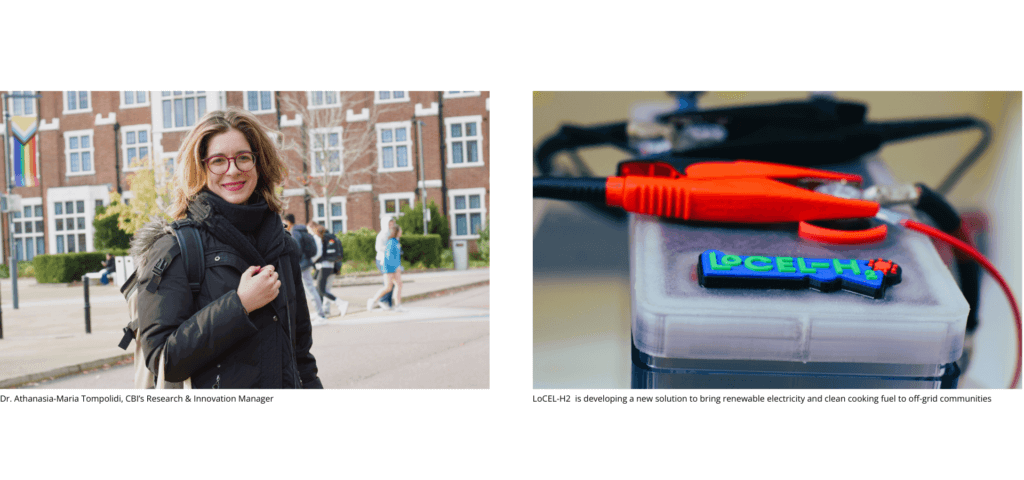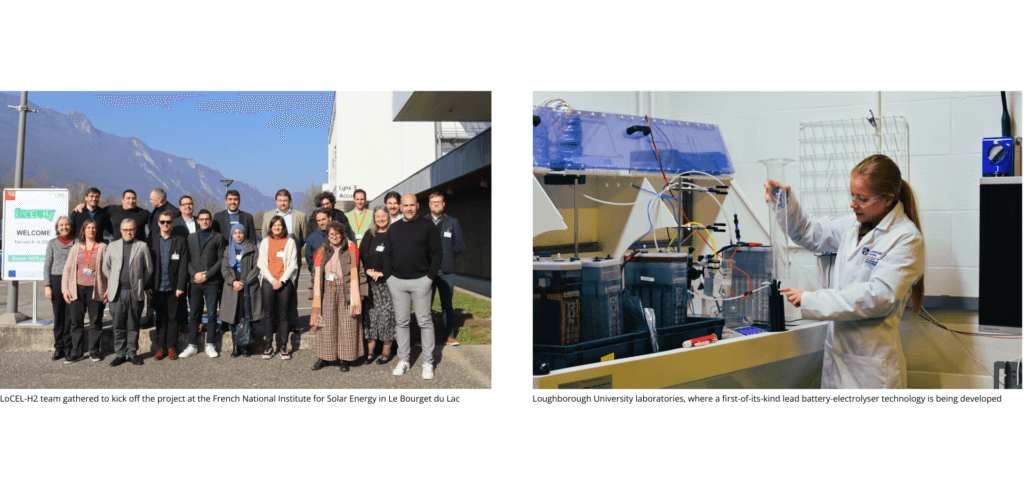
LoCEL-H2, a four-year initiative, is bringing innovative energy solutions to remote communities in Africa. In this interview, Dr. Athanasia-Maria Tompolidi, CBI's Research & Innovation Manager, discusses the project's goals, technological innovations, and commitment to community empowerment.
Let's start with the basics. Can you tell us what the LoCEL-H2 project is about and what it aims to achieve?
Of course. LoCEL-H2 is an innovative, four-year project under Horizon Europe that kicked-off in January 2023. It aims to bring scalable microgrid systems to isolated communities. These communities often lack steady access to energy like electricity and clean cooking facilities, which is taken for granted in the developed countries.
We combine solar power, advanced lead battery systems, and green hydrogen technology to offer sustainable and affordable energy solutions. And it is not just about technology. Empowering women in these communities is a big part of our project, especially in places like Zambia and Ivory Coast. We have an amazing team of partners from all over the globe, bringing diverse expertise to the table.
In a world teeming with green innovations and an urgent need for sustainable solutions, what sets LoCEL-H2 apart from the crowd, and why is it particularly crucial now?
LoCEL-H2 uniquely intertwines new technology with Social Sciences and Humanities (SSH) insights, hitting that crucial spot where technical solutions meet community needs head-on. We are in sync with the EU's hydrogen strategy and REPowerEU plan, introducing innovative ways for decarbonisation and independence from fossil fuels. By introducing green hydrogen solutions in developing countries, LoCEL-H2 contributes to global decarbonisation efforts and supports the European Green Deal's objectives.
Given the challenges posed by climate change, especially for vulnerable countries, projects like LoCEL-H2 provide essential tools for Climate Adaptation. It addresses critical issues such as food security, water supply, education, disasters risk reduction and public health.

From sunlight to energy storage
Innovation is key to the project. Could you explain how green hydrogen and advanced lead batteries work and why they're game-changers?
LoCEL-H2 stands on three innovation pillars. The first is a scalable, plug-and-play microgrid that uses solar energy to power communities. The second is a battery energy storage system tailored for households, small businesses, and community infrastructures to ensure a steady energy supply. The highlight is our community-shared battery-electrolyser, a novel system for energy storage and green hydrogen production.
Our vision with LoCEL-H2 is simple: we want to re-power the communities, quite literally. These smart innovations contribute to tackling energy poverty and provide sustainable solutions for those lacking access to reliable energy.
Could you give us an update on how the project is progressing and any significant milestones you've hit so far?
This past year has been remarkable. LoCEL-H2 has made significant progress thanks to our team's hard work and collaboration. We have mapped out stakeholder databases across continents. Our team has visited African and Pakistani villages to learn more about the communities and their energy needs. Key technical milestones of the project include the strategic design of our battery-electrolyser and advancements in energy storage solutions.
Our team has been meeting regularly, both online and in person, to ensure we stay on track. We had a face-to-face General Assembly in Naples in the autumn of 2023 and are looking forward to the upcoming one in Brilon, Germany, in the spring of 2024. It is very reviving to keep the in-person interaction.
Communities thriving on clean energy
Everyone's excited to see results. What are the short-term and long-term benefits LoCEL-H2 brings to the table?
LoCEL-H2 aims to change the way we access energy while promoting social and economic growth. Our focus is on innovative microgrid technology that combines battery-electrolyser and advanced lead battery energy storage to meet the unique needs of communities.
In short term, our goal is to empower communities by providing them with education and training on how to manage and benefit from these energy systems. We are working closely with people on site to ensure they are not just recipients but active players. This approach helps to create job opportunities and stimulate local economies.
In long term, we envision these efforts blossoming into sustainable, self-sufficient communities thriving on renewable energy. By introducing this technology, we're also helping to position the EU as a leader in clean energy innovation, supporting the green energy transition.

Beyond energy access, how does the project aim to influence societal change, for example?
At the heart of LoCEL-H2 is a deep commitment to societal change, particularly through empowering women in some of the world's most vulnerable areas.
We aim to see these women replacing old, smoky stoves with clean, green hydrogen, stepping into new roles, and changing the game in their communities. Our goal is to give them the time and resources they need to engage in social activities, achieve financial independence and be in charge of their own lives.
Moreover, with cleaner cooking, we are looking towards a greener future for them and the entire planet. It's a big vision, but with every step, we're closer to making it a reality.
Energy equity for sustainable future
Looking ahead, how do you plan to expand the reach of LoCEL-H2 to empower more communities worldwide?
Our aim for the future is to expand the impact of LoCEL-H2 beyond the current scope. We are working on integrating renewable energy into the very fabric of communities in need. This is particularly important when the world faces high energy demands and climate concerns, and sustainable solutions are needed more than ever.
Aligned with the EU's strategic priorities to mitigate climate change, LoCEL-H2 is committed to supporting the transition towards green energy across the globe, with a special focus on Africa, where the need is most acute. This can be achieved with collaborations with initiatives like Energising Africa and the Clean Cooking Manifesto. Increasing access to clean cooking is a topic that has been high on the global climate agenda, for example in the last United Nations Climate Change Conference COP28, and LoCEL-H2's technology is particularly well suited to be part of the solution.
Our approach is about connecting, sharing, and collective learning, which we believe to be some of the most valuable aspects of the project. We are sparking a movement through interactive webinars, training sessions, and collaboration with sister projects under Horizon Europe.
So, when discussing what's next for LoCEL-H2, it's all about showing that energy equity and a sustainable future are possible. LoCEL-H2 is dedicated to providing access to clean, green energy to communities worldwide. Its mission is to empower, inspire, and support the adoption of sustainable living practices worldwide.